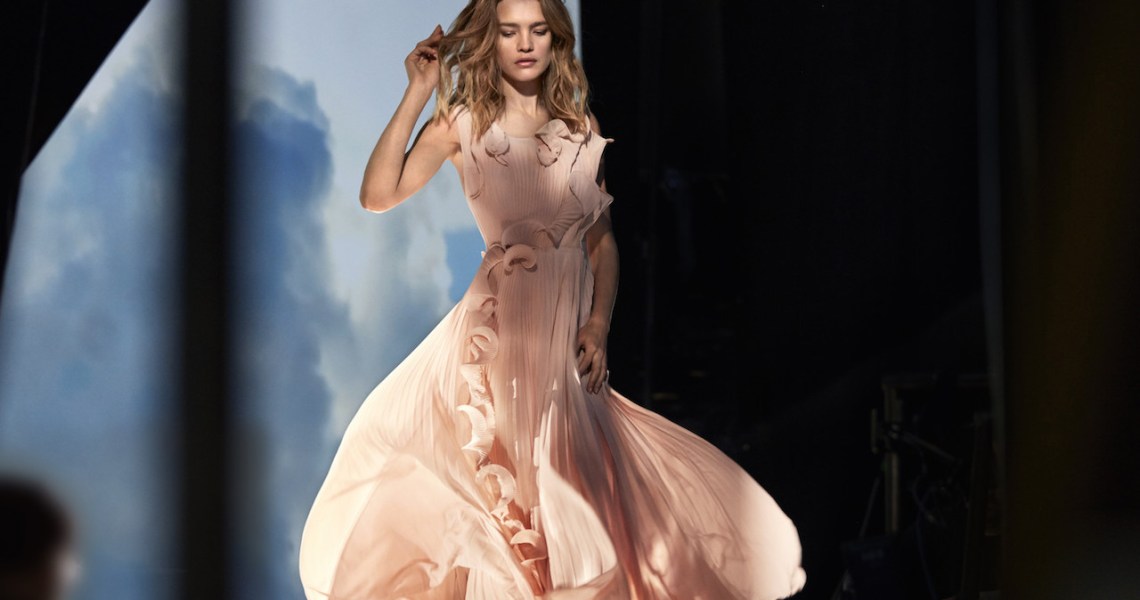Last week, a scandal involving H&M’s sustainable product labels presented one of the best reasons to be skeptical of sustainability claims. Additionally, we covered a variety of ways the fashion and beauty industries are responding to the Supreme Court’s overruling of Roe v. Wade, and we’ll continue to cover the fallout this week. Finally, Ganni is being sold off and a new celebrity-backed activewear brand has entered the market. Don’t forget to subscribe to the Glossy Podcast to hear my discussions with Glossy’s editor-in-chief Jill Manoff every Friday in the Week in Review show and Jill’s discussions every Wednesday with industry insiders like The Folklore’s Amira Rasool. – Danny Parisi, sr. fashion reporter
The problem with “sustainable” product labels
A Quartz investigation published on Wednesday found that H&M was regularly misrepresenting the environmental impact of its products. It’s a damning piece of reporting that caused H&M to pull all of its sustainable scorecards, or Higg sustainability profiles, from its online store, in response.
Quartz found that hundreds of products were misrepresented, shown to be more sustainable than they really were. For example, a product called the Antoinette dress that was publicly listed as using 20% less water than the baseline actually used 20% more than the baseline.
The story resulted in the Sustainable Apparel Coalition, a group of more than 250 fashion brands that developed the Higg sustainability profile, pausing their use entirely. The Norwegian Consumer Authority also said last week that the labels were misleading.
The fashion industry is largely unregulated, in terms of what kinds of sustainability claims a brand can make. Unlike the FDA, which requires a food product to meet certain criteria before being labeled “organic” or “cage-free,” for example, apparel brands have been able to make claims about sustainability with impunity. Anti-greenwashing laws have caught on in E.U. countries in recent years, but the movement to codify these rules is still nascent.
On the Glossy Week in Review podcast last week, Glossy editor-in-chief Jill Manoff and I discuss more about the H&M controversy and greenwashing.
The aftermath of overturning Roe v. Wade
The Supreme Court’s run of unpopular decisions continued last week: It ruled that the Environmental Protection Agency could not enforce regulations to protect the environment, and it announced it would hear a case on election law that has many election watchdogs worried. Still, the overturning of Roe v. Wade the week prior was the most inflammatory in public opinion: The majority of Americans support the right to legal abortion, and the Supreme Court’s ruling sparked mass demonstrations.
The beauty and fashion industries have responded in a number of ways, which we have covered on Glossy. Senior reporter Sara Spruch-Feiner spoke to the brands that have come out in full-throated support of reproductive rights about the necessity of speaking out. I wrote about the ways that companies are withholding coverage for abortion travel expenses for unionized employees. And reporter Tony Case, writing for our sister publication WorkLife, did a deep dive on how companies are handling the mental and physical health crises among employees that the decision has caused.
This story isn’t ending. We’ll continue covering the ways this decision impacts our industries and the thousands of women it employs.
Ganni gets sold
L Catterton, the private equity firm that owns brands like Birkenstock, is selling off the Danish fashion brand Ganni. Ganni’s buyers were not disclosed, but Reuters said interest has mostly stemmed from Chinese buyers.
L Catterton invested heavily in the brand beginning in 2017. While neither the terms of the original investment nor of the sell-off were officially disclosed, Reuters reported that L Catterton is selling Ganni for between $500 million and $700 million.
By all accounts, the Danish brand flourished under L Catterton, growing internationally and gaining a cult following among influencers. The sale was reportedly not due to missed targets or bad blood, but may be due to L Catterton looking to tidy up its portfolio ahead of a potential IPO sometime this summer.
More athletes try their hand at the celebrity brand model
Celebrity brands are common in beauty and fashion, from Rihanna’s Fenty Beauty and Savage x Fenty to Hailey Bieber’s recently-sued Rhode. Now, athletes are launching their own activewear brands.
Last week, a supergroup of athletes — baseball’s Derek Jeter, hockey’s Wayne Gretzky and ballet’s Misty Copeland — all came together to launch a new activewear brand called Greatness Wins. The brand is created in partnership with Chris Riccobono, the founder of Untuckit, who said it will launch online first and possibly open one or two stores this year.
But as the Business of Fashion noted in its coverage of the announcement: “Does activewear need another brand?” The space has become immensely saturated since the pandemic, including with other athlete-launched brands like Tom Brady’s creatively-named Brady.




